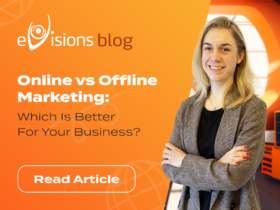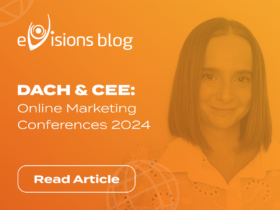SEO and PPC Synergy: The key to digital success?
08. 02. 2024 AutorAnyone who has ever started a business online has surely wondered how to get users to their website or e-shop and ideally increase traffic. And if you’ve asked yourself this question too, you’ve probably seen terms like PPC and SEO in your Google searches and findings. So, how to combine these two activities…
SEO and PPC can both bring you the right users to buy or request a service from you. However, SEO and PPC are often set against each other. Today, we’ll be looking at the other side of the coin and showing you how SEO and PPC can complement each other and why you shouldn’t forget either activity when creating your marketing strategy. You will also learn how to proceed if you have a limited marketing budget.
Content
- What is SEO and PPC?
- Differences between SEO and PPC
- SEO and PPC synergy
- Limited marketing budget – what if I can’t financially manage both?
- Summary
What is SEO and PPC?
Let’s first discuss what SEO and PPC actually are. SEO (Search Engine Optimization) is a set of activities that help you get your website to the top of search rankings and increase traffic. The better the position you get, the more likely a user is to click through to your website. The traffic gained from SEO is often called organic (natural) or unpaid, because you don’t pay for clicks to your site except for the cost of the SEO specialist or webmaster’s work. This is the major difference from PPC.
PPC (Pay-Per-Click) is the acronym for pay-per-click advertising in the online community. For example, you can see this kind of ads in the first two to four Google search results marked as “Sponsored”. In this case, you have to pay a certain amount of money for each access to the website from the advertisement (click through). This is why traffic from PPC ads is called “paid traffic”. If you’re considering PPC, you need to take into account both PPC cost for ad management and for system credits.
SEO and PPC: Differences
To get the full picture, let’s look at the specific differences between SEO and PPC. While this article is primarily about the synergy of these two marketing strategies, there are significant differences between SEO and PPC, and you should know them.
| PPC | SEO |
You pay for clicks to the website and for administration. Faster results. You can see the first traffic from day one. Investment in PPC credits increases with time. Turning off PPC = immediate loss of traffic and revenue from this source. Dominant SERP position – ads appear above organic results. A PPC specialist should give you feedback on the site and tell you what could be improved to make the ads work optimally. However, this is not his specialty. | Clicks to the site are free and only the specialists are paid. It takes time to see results from regular optimization. Long term more or less the same amount of investment. If you cut off the work of the SEO specialist, you will continue to benefit from SEO. It takes a while to get to the top positions in the organics, especially if there is high competition in your industry. With SEO, you can make changes to your site that can improve conversion rates in other channels. |
SEO and PPC synergy
As you will probably know from the introduction above, both SEO and PPC bring users to your website, which means extra revenue for you. But how do these two activities complement each other?
SEO content + PPC audience
In paid advertising, you’re often working with a target audience, a group of people who have common drivers. They share the same topics, read the same articles online, or buy similar products. Therefore, after a certain period, you can see from PPC analysis which audience brings the most sales to your website.
You can then create an SEO content strategy that is relevant to this target audience. For example, through the creation of interesting articles and content optimization, SEO helps to increase traffic to the site, thereby expanding the audience for PPC remarketing campaigns. Keep in mind that without enough site visitors, remarketing will not work.
Technical aspects of the site
Having a website does not mean having orders. A website must meet certain technical requirements, such as loading speed. If the technical side of the site is lame, ads will not help your sales. Everything goes hand in hand.
SEO, however, can help you significantly. Technical SEO deals with just these aspects of a website. An SEO specialist can identify major technical issues on a website and work with the webmaster to solve them. This will have a significant impact on the performance of campaigns, because once the user gets to the site from PPC ads, it’s the site’s responsibility to make the user place an order.
The performance of one channel may not be forever
Imagine that most of your orders come from paid traffic. But suddenly Google rejects all your ads in the ad system and the traffic is gone. And with it, most of your sales.
Or, vice versa, most of your sales are coming from organic traffic and a new Google Update causes you to lose your top positions in organic search.
How to avoid having one of these traffic sources drop out and become a problem for you? Ideally, work on both sources so that you can be sure that when such outages happen, there will be a drop in sales, but it will be sustainable for your business.
More Data More Knowledge: How to Use Data in Practice?
Data analysis is part of SEO and PPC. This data (even if it is the same website) may differ or have something extra. When SEO and PPC work together, individual specialists can share data with each other and use it for their activities.
Which analysis is worth sharing with each other?
- Keyword analysis
- Competitor analysis
- Keyword conversion analysis
- UX analysis
- Landing page analysis
A PPC specialist can provide the SEO specialist with keywords that convert in the advertising systems. The SEO can then follow this up with relevant content. The SEO specialist can provide the trending keywords, which the PPC specialist can tailor the ad campaigns to. PPC specialists often run A/B tests on ad content as part of their management, and SEO specialists can build on their data by adjusting meta tags on the site. If a PPC specialist notices poor performance and the ad data indicates that there is a problem with the landing page, the SEO specialist can help identify the problem and correct the content or technical aspects.
Limited marketing budget – what if I can’t financially manage both?
Try answering the following questions:
Do I offer a unique product that is not frequently searched?
In this case, we would recommend starting with PPC. If your product isn’t being searched, SEO will not work. On the other hand, because PPC doesn’t just include ads that show up in search results, but also, for example, banner ads or social media ads, PPC can get new products in front of users even without being searched for. Once users are searching for your products, SEO can come into play.
Is my industry a competitive industry?
If you are in a competitive industry, be sure to check the cost per click before deciding between PPC and SEO. For example, use tools like Marketing Miner or Keyword Planner in Google Ads to find it out. If you discover that the cost per click is really high (in some industries it can be up to 8 € per click), SEO will probably be cheaper for you and it is better to invest in it first. In this case, for PPC you would not only need a budget for management, but also a substantial budget for the advertising system alone.
How much is my website worth?
You can see at a glance that the site needs some improvement? Is it a slow loading website and not very user friendly? If yes, then it will be better to invest in SEO that works by adjusting these factors. If you chose PPC for a slow loading website, for example, the new user would probably leave the site again pretty quickly. And you don’t want that if you’re paying for their access to the site.
Can I wait for the results or do I need them immediately?
If it was too late yesterday to increase traffic to your site, we recommend you choose the PPC strategy. Getting relatively stable results with PPC can also take a while, but you’ll see traffic from ads almost immediately. To see the benefits of SEO in terms of traffic takes a few months.
Summary
We always recommend focusing on different sources of traffic, which is always the best and least risky for businesses. In this way, you do not have to worry about your business as a whole in case one of them declines or fails. Plus, by sharing information and data analysis, SEO and PPC working together can yield better results for both sides. If you have a limited budget, choose one of the activities to start with. But in a long-term marketing campaign, account for both.










Komentáře